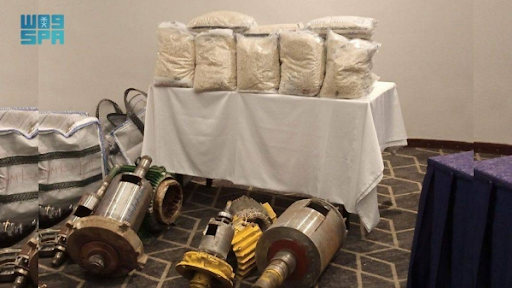Nigeria Facing Security Risk From Pills Associated With Syria’s Civil War
Anti-narcotics authorities in Nigeria have seized a large consignment of Captagon pills. This seizure raises concerns about the threat posed by transnational drug smuggling networks producing and distributing the stimulant linked to the war in Syria.

Authorities in Nigeria have intercepted nearly half a million pills of Captagon, a synthetic stimulant drug associated with the Syrian civil war that has caused one of the world’s largest and deadliest humanitarian crises; a conflict that has left more than 400,000 people dead and created millions of refugees and internally displaced persons.
Apart from millions of dollars in revenues generated from trafficking Captagon. Fighters also use the pills to increase alertness.
In September, Nigerian authorities intercepted nearly half a million amphetamine pills hidden in machinery coming into the Apapa port in Lagos, Southwest Nigeria.
According to the country’s Drug Law Enforcement Agency, the 451,807 captagon tablets worth $11.3 million N5.8 billion were seized following intelligence from international partners, on the shipment of the illicit narcotic to Nigeria from the Middle East.
The Drug Agency chief, Buba Marwa, shared a timeline of the joint operation stating that “On Sept. 1, 2021, 18,560 tablets of a drug, suspected to be Amphetamine (Captagon), weighing 3.2kg, was found deeply concealed in one of the coils. On Sept. 2, the other two machines were dismantled, and in all, a total of 451,807 tablets, weighing 74.119 kilogrammes, were discovered hidden inside the rotor coils’.’
According to Authorities in Saudi Arabia, The Kingdom collaborated in the efforts that led to the interception of the captagon consignment from Lebanon to Nigeria by drug production and smuggling network. In May, Saudi authorities thwarted an attempt to smuggle 2.7 million amphetamine pills into the country.
The Kingdom’s Zakat, Tax and Customs Authority at Jeddah Islamic Port and Saudi Arabia’s General Directorate for Narcotics Control, were reported to have monitored and seized the drugs at Jeddah Islamic Port. In October, the Zakat, Tax and Customs Authority at Jeddah port intercepted more than 12 million Captagon pills, which were found hidden in a consignment of cocoa beans.
In April, Saudi Arabia banned Lebanese fruit and vegetable imports over drug smuggling concerns. TheGuardian reported that before the April seizure of millions of Captagon pills, which led to a ban in Saudi Arabia on all agricultural imports from Lebanon, at least 15 other shipments of the drug had been intercepted in the Middle East and Europe in the past two years.
It added that officials in the Middle East and Europe told the news outlet that all were shipped from Syria’s Captagon heartland, or across the frontier in Lebanon, where a network of untouchables – crime families, militia leaders and political figures – have formed cross-border cartels that make and distribute industrial-scale quantities of drugs.
International partnership to obstruct the cross border movement and smuggling of dangerous drugs is important, however, this has to be done alongside global action to address the Captagon’s drivers including the activities of actors in Syria.
Syria is described as one of the world’s foremost narco-states and global epicentre of Captagon production. The Center for Operational Analysis and Research (COAR) report stated that the decimation of conventional economic activities has increased the relative attractiveness of industrial-scale drug profiteering, which has been largely captured and controlled by narco-entrepreneurs linked to the regime of Syrian President Bashar al-Assad and the regime’s foreign allies.
According to COAR, “although Captagon trafficking was once among the funding streams utilised by anti-state armed groups, consolidation of territorial control has enabled the Assad regime and its key regional allies to cement their role as the prime beneficiaries of the Syrian narcotics trade.”
The organisation, in its report, added that the Syrian drug industry likely cannot be curtailed until the conflict itself ends and political conditions allow for international enforcement initiatives to be directly coordinated with the Government of Syria.
In Nigeria, there is a need to strengthen the capacity of security services to detect and disrupt the use of the country as transit or destination for Captagon pills as well as efforts to mitigate internal risks that could encourage consumption.
Support Our Journalism
There are millions of ordinary people affected by conflict in Africa whose stories are missing in the mainstream media. HumAngle is determined to tell those challenging and under-reported stories, hoping that the people impacted by these conflicts will find the safety and security they deserve.
To ensure that we continue to provide public service coverage, we have a small favour to ask you. We want you to be part of our journalistic endeavour by contributing a token to us.
Your donation will further promote a robust, free, and independent media.
Donate HereStay Closer To The Stories That Matter




